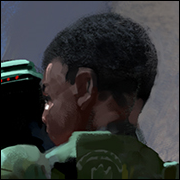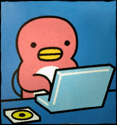|
That sentence construction seems fine to me. Losing the 'my' enhances the immediacy of the action. This is gut feel, not adhering to a specific rule or anything. That said, I'm not sure what's actually happening.
|
|
|
|

|
| # ? May 10, 2024 21:10 |
|
kaom posted:Seriously this stuff is amazing, I canít say enough how much I appreciate these posts. I need to read these resources youíve shared because I donít know any of this. When we got into French sentence deconstruction in likeÖ year 11 of studying it, my mind was blown at actually seeing how to pick something apart into more than just actor/subject/verb. But it wasnít a 1:1 match to English, obviously, and we never went this in-depth. Yo, itís cool. Iím enjoying explaining poo poo because itís helping me untwist a few knots in my brain from working on this stuff on my own for so long. So, ďIím moving backwards, my momentum all wrong.Ē Iím gonna go through the fully grammatical sentence before going into why leaving ďmyĒ out is actually ok. I [subject] am [verb] moving [participle] backwards [prepositional adverb] Ė this is complete clause, so the question is, what is the next one doing? Well, momentum is a noun. My [subject] momentum [noun possessed by subject ďmyĒ so itís a genitive noun phrase] all wrong [adjective phrase modifying momentum]. This is what they call a relative clause, because actually refers all the way back to your original subject ďIĒ and this is why you can leave ďmyĒ out. Everyone talks like this all the time, because if you can infer something from context, you can leave it out. It confuses a grammer program because itís looking for the possessor of the possessive noun phrase ďmy momentum.Ē Itís not proper grammar, but in a novel if you can punch up a mental image by saying, ďgently caress proper grammarí you can. We know my is implicitly there. Hell, I write sentences without the subject I if it can be implied, because thatís how people talk and Iím writing in first person, so the grammar checker can go straight to hell.
|
|
|
|
Stuporstar posted:Hell, I write sentences without the subject I if it can be implied, because thatís how people talk and Iím writing in first person, so the grammar checker can go straight to hell. I feel like I have an entire editing pass that is entirely getting rid of unnecessary words and half of them are subjects that aren't needed. Reference is far more complicated and gooey than we think it is. To steal an example from Tom Roeper*: quote:Suppose I point to a book and say, ďHave you read that?,Ē using one of the words that seem designed to point to specific objects. But I do not mean literally that book, nor even one with the same print or the same cover. If I read Moby-Dick and you did too, you could answer ďYes,Ē even though my copy was paperback and yours hard-cover. Another Roeper example: quote:Here is how we usually talk: That aside, there's some interesting reference wonk in the passage about climbing but it's actually before the part we were talking about. The implied subject of It in quote:It misses me on the way down But that also aside, the confusing bit to me in "I'm moving backwards, momentum all wrong" isn't the subject (which you could ditch entirely if you want to), but the actual action because the reference frame doesn't match up with my conception of climbing/the scene. We've got a chunk of ice falling down and missing the narratoróvertical motionóand the object of climbing is presumably to move upward, so does "backwards" mean down towards the ground? Maybe it's supposed to be confusing or chaotic, but it would be clearer to just say so if that's what's intended: quote:It misses me on the way down, but I was too slow to reactóIím falling, momentum all wrong. So to rewind to the original version: quote:Part of the ice sloughs off, taking my axe with it. I release my white knuckled grip on the handle as soon as I realize whatís happening. It misses me on the way down, but I was too slow to reactóIím moving backwards, momentum all wrong. quote:Part of the ice sloughs off, taking my axe with it. I release my white knuckled grip on the handle as soon as I realize whatís happening. It misses me on the way down, but I was too slow to react. Momentum all wrongóIím moving backwards. Stuporstar posted:Transitive verbs become passive when in the stative form in Ancient Egyptian, and it was one of their more common forms of passive voice, so itís how itís translated. English has the grammar tools to translate this and we even make stative statements like this without knowing thatís what weíre doing. Could be because we had a stative but mostly dropped it along with, ďJesus is comeĒ and the thees and thous of the Bible, but German has it and still uses it. We can still use it too, itís not gone. AAE/AAVE has some interesting stative and habitual aspects that are worth reading up on if you're interested in this. * The Prism of Grammar: How Child Language Illuminates Humanism. Worth a read for anyone interested in this poo poo, and totally comprehensible without a background in linguistics. Wallet fucked around with this message at 15:46 on Feb 22, 2022 |
|
|
|
Wallet posted:That aside, there's some interesting reference wonk in the passage about climbing but it's actually before the part we were talking about. The implied subject of It in Huh, yeah. I assumed the ďmomentum all wrongĒ was a way of describing the character feeling a sudden lurch as they start to fall, and reordering the last sentence does get that across better. quote:AAE/AAVE has some interesting stative and habitual aspects that are worth reading up on if you're interested in this. Oh yeah, the habitual ďbeĒ is interesting, and itís funny how the verb ďbeĒ is always the one to get bootstrapped to that use, if a language has it. It was used the same way in Ancient Egyptian. They used the imperfective of wnn (be, being) as an auxiliary verb to establish a continuous aspect before a stative verb, and a habitual aspect before a perfective verb. The perfective wn was used like ďbeenĒ to give clauses past meaning.
|
|
|
|
While we're discussing grammar: Does one forage for mushrooms? Or do they simply forage mushrooms?
|
|
|
|
ultrachrist posted:While we're discussing grammar: Does one forage for mushrooms? Or do they simply forage mushrooms? Either but they're different things. With "they forage mushrooms" (verb with an object) you're telling me about a thing they do to mushrooms: they collect them. With "they forage for mushrooms" (verb without an object) you're telling me about an activity they engage in; they search for mushrooms, they may or may not find them.
|
|
|
|
ultrachrist posted:While we're discussing grammar: Does one forage for mushrooms? Or do they simply forage mushrooms? Forage for is what I'd typically use, it seems wrong without it, though I guess "they foraged mushrooms to stay alive" works.
|
|
|
|
Series writing questionsÖ Iím struggling with this issue currently. How much reminding of setting/characters/previous events do you need to put in to each book for your readers? I tend to not like or need a lot of reminding in the series Iím reading, because if I find something I like I read all of it fast. So my tendency is to keep it to the bare minimum, to what feels organic for the characters reflecting back. But I get that there will be delays between one book and the next. Do I need to worry about readers who wait for the next installment? Probably not because no one buys my poo poo, but like in general? On the other hand, how likely is someone to pick up book 2 in a random, unknown ebook series on Amazon? These are not going to be bestsellers that people grab from a display table on a whim. Is there even really a reason to worry about accessibility for new readers? Or should you just jump in right where the story continues? Iíve noticed a trend in the series Iíve read on Amazon to not bother with much reminding or plot summaries. The next book just flows right on from the previous one. This feels really different from the series I have actual physical copies ofólots of reminding in those.
|
|
|
|
To your last point, are the printed series you have older than the e-books? I kind of feel like the older stuff would take years between, and maybe that interval has shortened, so perhaps recaps/flashbacks might not be as necessary. Totally unfounded, just a thought. I donít think people picking up book 2 of a series randomly happens often, if ever. I feel like, depending on story type, etc., you could do some recap/bridging in a foreword/introduction, otherwise a few flashbacks?Straight exposition seems awfully dry (though Iíve seen it used, canít recall where though).
|
|
|
|
Maybe Iím thinking of something like The Dresden Files, where the repetition used to introduce the characters/setting gets really grating after youíve read through maybe 3 of them. ETA: Yeah, the printed series are way older than the ebooks Iím reading. I think I stopped buying print books in like 2002 or something? Maybe itís more that the genres I like have changed, I donít know. newts fucked around with this message at 20:48 on Feb 27, 2022 |
|
|
|
Yeah, an all-italics "Previously on" at the book's very start is how the Deltora Quest series that inspired me handled it and that worked pretty fine. Recap the broad overlying goals, the major characters and the big events of the previous book in an out-of-universe bit near the start and you should be mostly fine.
|
|
|
|
Hello, in an odd feat of manifesting my desires I was complaining about there being no writing groups near me and now I have been made aware of a brand new one starting on wednesday in a cafe a mere five minute stroll from my front door. As it is a new group, and I have never been to any group before, are there any tips beyond the stuff outlined in the OP? All my work is done through scrivener on my laptop but I feel, especially for a starter session which apparently will include an open mic for people to read their writing and the opportunity for others to workshop their current projects, it could be anti-social to take the laptop with me. I was thinking perhaps pen and notebook for now while I test the water. My ability level is terrible wannabe, for reference.
|
|
|
|
Bacon Terrorist posted:are there any tips beyond the stuff outlined in the OP? How big is the session? Because if it's open mic that sounds like a lot of people to me? I've not done an in-person writing group for fiction, though I have for musical theatre and that was about 8-10 people (some are in writing teams) gathering in a rotation of everybody's living rooms. The expectation was everybody brings something for live reading for the purpose of critique and everybody got about 15-20 mins each. The default was hard copies for all, because it's just easier to manage hard copies in person. Apart from those logistics:
|
|
|
|
You can also do what I did and form or join an asynchronous writers group. They're not that difficult to set up and it gets around the geography problem very easily. Time zones are meh.
|
|
|
|
Thanks for the responses, so the event on facebook shows 10 attending including me, and another 10 maybes with this description:quote:The Pantry’s Big Write Out Which sounds to me like they are more testing the water to see what the attendees are interested in rather than focusing on a specific angle. At the least I guess it would ve nice to meet some locals since I am not a native in this town, a little networking never hurt anyone. I don't have anything finished properly though I do have a 500 word opening chapter of my current novel idea that could be polished as something to take with me since it is self contained (a kid running away from unseen antagonists in the dark, the protagonist not in the scene at all).
|
|
|
|
Another possibility if you're keen on writing and getting feedback on your writing is Thunderdome. https://forums.somethingawful.com/showthread.php?threadid=3989882 The current week is going to wrap up soon, but there will be another prompt once that's done.
|
|
|
|
Current week is atypical, it's a week 500 free for all, but its a great way of getting used to sharing your stuff.
|
|
|
|
I'm feeling kind of zapped. I have a novel draft that I've been putting through really helpful critique groups, but my problem is that while I got really helpful critiques on my draft, I got so little positive feedback that I was starting to get the thought that I shouldn't even bother writing. It's been depressing and causing me to have no progress on my re-write. I told this to some people in my feedback group and while one reader went off on a really unexpected "millenial snowflake participation trophy" rant (which is odd because they didn't seem like they would be type), the other two readers came back with "We're industry professionals reading this on our own time. If we didn't think your novel had potential, we wouldn't be bothering at all." It was nice to hear, but it's just demoralizing to come home wiped out from my job just to sift through the same critiques and suggestions as I question what voice I should use and if I should just scrap an entire chapter and re-write it from scratch.
|
|
|
|
Donít give up! Itís hard to get critiques. And itís hard to get told that somethingís not working and to realize you might have to rewrite a big chunk or scrap something youíve worked hard on. That doesnít mean thereís nothing good there. Also, I think 2 of 3 critique partners have a good point: of course theyíre going to focus on the Ďbad stuffí. Itís actually a lot easier to get deep, good crits on work thatís mostly really good. It makes the problems stand out more sharply, and makes them easier to recognize. As opposed to something thatís just a big old mess from start to finish. I say this as a person who had to give up doing art professionally because I just couldnít take the crits. Writing is only slightly less painful.
|
|
|
|
Coquito Ergo Sum posted:I'm feeling kind of zapped. I have a novel draft that I've been putting through really helpful critique groups, but my problem is that while I got really helpful critiques on my draft, I got so little positive feedback that I was starting to get the thought that I shouldn't even bother writing. It's been depressing and causing me to have no progress on my re-write. Sounds like you need an enthusiasm reader. Do you know anyone who likes the type of story youíve written? Finding someone whoís more your average reader type than a pro looking to help you find problems is also important because it keeps the end goal in mindómaking something a reader wants to read. Letís face it. Brandon Sanderson just made 23 million on kickstarter last week, and his prose is a lazy pile of cliches strung together. The average reader is a lot more forgiving than writing pros and your average crit group. What readers are less forgiving of is if they stop being entertained by the story itself. J.K. Rowling as well (gently caress her in her TERF ear) told the story to her kids before she ever tried to sell that poo poo and ended up writing something kids loved even though her prose is a thick wad of rotting newspaper. So at this point, where youíve already got a shitton of notes on how to improve the story, show your improvements to someone who isnít looking at the micro-structure and simply ask if they can follow along and are enjoying it. Then youíll know if you should scrap whole chapters or not. I took Vonnegutís advice about writing for just one person in mind, or a few. Thatís who I keep in mind when I write, and thatís who I hand my polished chapters to (not first drafts cause theyíre completely unreadable). If I want my poo poo ripped apart, Iíll toss it to the larger crit group, but my enthusiasm readers are just friends who are interested in my poo poo. Watching them enjoy my absolutely mad bullshit reminds me of why I bother. I want to entertain people (and myself). And also one of them told me reading my wild musical prose full of conlang makes them feel like theyíre on drugs, and thatís one of the best responses to my poo poo Iíve ever heard.
|
|
|
|
Coquito Ergo Sum posted:I'm feeling kind of zapped. I have a novel draft that I've been putting through really helpful critique groups, but my problem is that while I got really helpful critiques on my draft, I got so little positive feedback that I was starting to get the thought that I shouldn't even bother writing. It's been depressing and causing me to have no progress on my re-write. People read differently when they're trying to be critical than when they're just in reader's trance. People are also very fond of fussing around with work that's written at around their skill level because they're engaging with it at a "how would I do this" level. So if you have peer critique groups, about 2/3 of the feedback you get will be useless ó†about 1/3 will be flat wrong and 1/3 will be wrong for your story, it's just people trying to tell the story tehir way. When you critique work that's of a very dissimilar skill level from yours, you kinda see how little some of the stuff that crit groups obsess over matters. I used to teach at a teen writers' workshop and when I was like 20 I'd give very detailed line level crits with tons of suggestions. When I got older, my crits were generally of the form "here's a few things I really loved, here's something to attack in your next story, good job, move on to your next project." Because what was actually wrong with the story was usually just a fundamental 'this story is intrinsically not about anything' or 'this is a tribute to pop culture you love, not your own story yet' and the answer was just to keep writing. And to keep writing you need to feel, in the moment of writing, a kind of joy and power. If you don't, what's the point? You have to be able to hold on to that core creative jet and guard it against everything that tries to put it out. That's as important as getting critique.
|
|
|
|
I think one issue is that my last reading crit group was done largely on Discord voice chat, so if someone said "I don't like what you did there" then I could immediately clarify that "What I meant to do is this, and it's supposed to tie into another moment later in the story" and then we could talk about how to better do what I'm trying to do. These new readers give their feedback entirely in text because they're very busy people, so I can't really clarify myself easily if they maybe misread something that they criticized. It's weird you mention Sanderson because he's kind of inspiring me to write more simply. I was reading through Stormlight, only really half-caring after the second book. Despite how much I truly hated Rhythm of War, I have to admit I couldn't put it down, largely because it was so easy to read. So I've been using my experience with that to try and emulate his readability while keeping my own voice. I did have an enthusiasm reader group when I first shopped the earliest drafts of the story when it read like a half-novella like seven years ago, and that resulted in one of my readers doxxing me and sharing bits of the story with my family/friends to mock me. There were bright spots, though. I intentionally picked up readers who have hated every fantasy novel they'd read and their feedback was that my draft was the only fantasy story they ever enjoyed. One such reader said it felt like the only time that someone with actual life experiences wrote fantasy and another such reader said it read like if John Carpenter rewrote Death Wish (the book, not the movies) as a fantasy novel, which I think cannot be topped as a compliment to me. Those compliments actually fueled me enough to keep working on it over the next few years to finish it. I'm going to have to get over that first bad experience and just find a new group once I finish this round of touch-ups. Coquito Ergo Sum fucked around with this message at 18:28 on Mar 7, 2022 |
|
|
|
Chairchucker posted:Another possibility if you're keen on writing and getting feedback on your writing is Thunderdome. I get more out of a dedicated writers group, with the same audience, that I meet in person, than any online group. The thing with meeting in person is you can discuss the critiques. Also if the members are consistent, you can pick up on what the critiquer likes and dislikes, as well as the style they appreciate. This lets you dissassemble and understand their critique a lot better. TD has a constant changing list of judges, which makes it hard to disassemble critique you get.
|
|
|
|
I've noticed that with internet / text critiques (including SA), there's often an ethos that harsh (but not mean spirited) criticism is the norm and learning how to accept this is part of being a writer. I don't disagree with this and myself desire blunt feedback since I'm usually panicked that something I am missing is terribly wrong. BUT, basically every in person (including zoom) writing workshop or group or class I have joined does not work like that. There's always a forced positivity mechanism. Like, you have alternating periods of "Say something that works" and "Say something that needs improvement". Or feedback needs to be an 'I' statement. It's used to keep morale up but also can be useful in itself. I remember one case where the first work someone submitted was quite bad throughout, but rather than list all the ways it went wrong, the feedback focus mostly zeroed in on the one good nugget in the story and emphasized why that worked. Then, the person's second work of the class tried to follow that and it was 100000x better and much easier to help improve.
|
|
|
|
The coaching adage I know is to meet people one step ahead of where they currently are, and I think my online crit group is very good about asking and directing each other toward what type of feedback would be helpful. My novelís draft isnít ready for line level crits - Iíll address and learn from those if something jumps out, of course, but Iím still at the stage where Iím fixing structural/character/setting issues, so a lot of things are likely to change or be scrapped. Sometimes Iím stuck moving forward on my own and post a first draft like ďthis is terrible and not working, can someone take a look and tell me which parts are boring / confusing / lame and which parts you want to see more ofĒ and the feedback helps me figure out what direction to move in. The group knows thatís the point of polish that Iím at, so no one is going through my prose with a fine-tooth comb looking for every filter word. Keeping target readers in mind does matter for interpreting crit, I think. Iím writing YA right now and itís pretty girly - my partner (an adult man) might have things fly over his head, like the protagonistís oblique aside being glad sheís not on her period, but thatís totally fine. If a bunch of target readers are confused then my conveyance is the problem, but life experience has a huge impact on how you understand and relate to something. That line wasnít written with him in mind, so no worries if he doesnít get it. Professionally, I see A LOT of imposter syndrome. Itís common for people who view each other as peers to forget that itís valuable to focus on whatís been done well instead of only narrowing in on improvements, and enough of that can get anyone down. I think all the suggestions here might help - trying another group or another medium, communicating what crit you need in the moment alongside the work, and weighting the feedback against target market. (Also I want to thank Stuporstar again and also Wallet for the amazing grammar posts - appreciate you both, I felt weird bumping the thread just to say ďthanksĒ but I loved the input and am still taking it in. I finally learned what a gerund is!
|
|
|
|
General Battuta posted:People read differently when they're trying to be critical than when they're just in reader's trance. People are also very fond of fussing around with work that's written at around their skill level because they're engaging with it at a "how would I do this" level. So if you have peer critique groups, about 2/3 of the feedback you get will be useless ó†about 1/3 will be flat wrong and 1/3 will be wrong for your story, it's just people trying to tell the story tehir way. This is very useful. Apologies if this has been raised last few pages - I skimmed but couldn't see it - I'm at the point I have a nearly finished draft of a novel and I'd like to use people I know in some kind of a beta readers group. I've also been thinking about putting the draft on a shelf for a bit and working on something else before coming back to it, and I was musing about using a group of acquaintances with fairly diverse background and professional experiences on a chapter by chapter basis on this second project to get critical feedback as I go. In either case I'd be after feedback via email, I think. Keeping your advice in mind I think I still want to give it a go. Any tips for any directions or guidance to provide a beta group in advance to make the group and its feedback as useful as possible? Really interested in anyone's experience with beta readers and how to get best utility out of them. I'm not that worried about taking the critique personally, but I do want to use people's time and skills effectively. I was planning to tell them to hold off on line edits and save that for phase 2, but be thinking about plausibility (especially of character motivations and actions), coherence, anything they didn't understand etc. The first project is fantasy and the second is sci-fi. (I've done a lot of professional writing for $$$, but not fiction until now, except for hobby/experiments). Critique groups are hard for me as I barely can make time enough for writing my own stuff, between work and family, and I'd want to contribute properly. But something I'd like to do eventually. Edit: I just saw your post, kaom, and that's also very useful. Thanks.
|
|
|
|
Blamestorm posted:This is very useful. Apologies if this has been raised last few pages - I skimmed but couldn't see it - I'm at the point I have a nearly finished draft of a novel and I'd like to use people I know in some kind of a beta readers group. I've also been thinking about putting the draft on a shelf for a bit and working on something else before coming back to it, and I was musing about using a group of acquaintances with fairly diverse background and professional experiences on a chapter by chapter basis on this second project to get critical feedback as I go. In either case I'd be after feedback via email, I think. When you say a group of acquaintances do you mean basically your friends/workmates/etc? Just be aware that when you send your writing to friends, most of them won't read it and of those that do, most will just say "It was awesome dude, great job!" Not to say you shouldn't do it, I love sharing writing with my friends and family, but I don't usually get a lot of productive feedback out of it.
|
|
|
|
When I was discussing my female protagonist with my sister for a little insight she helped me see through the problems I was creating for myself with regard to how 'girly' I was making her. Originally I was having trouble between a sassy tomboy characterization or a graceful, cool, and ladylike (but still capable of fighting) one. I decided on tomboy but then the problem was if she actively loathed femininity or had a secret girly streak she desperately wanted to keep hidden. My sister helped me realize that's a bad binary and now I've settled on Haruka being tomboyish, but still open to feminine experiences.
|
|
|
|
Blamestorm posted:In either case I'd be after feedback via email, I think. Has anyone read this draft yet? And do any of those people read in the genre/niche you've written? If it's a first draft, and you want a sense check on big picture structural stuff, you're probably looking for alpha readers. In which case, you want people who are good at critiquing structure and can look past sentence level stuff. I personally don't think what they read for fun matters so much, because fundamental storytelling principles transcend most genres. Just be aware they might not be familiar with genre conventions, tropes, etc and account for that when you consider their feedback. If the draft is in reasonably good shape structurally and you're looking to see if things are landing emotionally as intended, then yeah, beta read is what you want. In which case, you want the people who are at close as possible to your target readers. They will let you know how on point your market positioning for the book is by their feedback on what they enjoyed and what they didn't. If you're writing like Erikson, you probably don't want readers who are fans of JK Rowling. Do not get feedback via email. Email will drive you mental. You will lose track of what people are saying and waste a while bunch of time copy/pasting from emails into documents. Use a survey so all the answers are collated in one place. Survey design is like an entire specialized field and I'm not qualified in it. Based on my own experience however, I suggest the following: - use a combination of question types. - generally you want quite a lot of open ended questions because those elicit feedback that you wouldn't have thought to ask for - do break down open ended questions into manageable chunks so the feedback is easy to parse. "How did you find the book?" it's too big, but "How did you find the characters? Comment re: distinctiveness, consistency, motivations, how 'real' they felt" is still open ended, but more focused and therefore manageable - you do want some closed questions in there too, because those help give you direction and contextualize the longer form feedback - closed question types vary, but I like asking for a rating out of 5, because that's what most review platforms ask for. That gives me an idea of how much farther I need to go before I can release - frequency of feedback affects the kind of feedback you'll get. Immediate reactions are best done inline; fairly immediate reactions best done after each scene/chapter and then overall reactions best done at the very end. I went for feedback after every chapter (about ~5-10k words on average) and that was a good balance for me. I did slightly longer check in surveys after Ch 3 and the midpoint, and then a long overall book level survey at the end. That's 15 surveys in all and still a bit hard to keep track of. I do wish I had structured the chapter surveys to have questions on a scene level basis and the next time I run a beta read of a prose novel I'll definitely be spending more time on the survey design. Mostly, I wish I had broken up each chapter survey into sections on each scene, because what ended up happening was people were split on which scenes they liked/disliked so asking that question at the chapter level meant I had an incomplete picture at the scene level. I still have an overall sense of which scenes worked/need more work but it's less precise. Leng fucked around with this message at 12:13 on Mar 8, 2022 |
|
|
|
Sailor Viy posted:When you say a group of acquaintances do you mean basically your friends/workmates/etc? Just be aware that when you send your writing to friends, most of them won't read it and of those that do, most will just say "It was awesome dude, great job!" No, good point but other writers I know - aspirational, professional or in other non fiction disciplines - and also big readers. And a select few of those who have indicated theyíd be happy to help. A lot of them work in creative or professional sectors where I think theyíd bring the right kind of lens, but I probably need to think through what best to use them for specifically so I donít waste their time.
|
|
|
|
Leng posted:Has anyone read this draft yet? And do any of those people read in the genre/niche you've written? This is all excellent advice, thank you. I hadnít thought about that differentiation between alpha and beta readers. I also do have a lot of survey experience and thatís a really good idea - I hadnít thought about something that structured, but it makes sense. Lots to think about. Thanks again.
|
|
|
|
General Battuta posted:People read differently when they're trying to be critical than when they're just in reader's trance. People are also very fond of fussing around with work that's written at around their skill level because they're engaging with it at a "how would I do this" level. So if you have peer critique groups, about 2/3 of the feedback you get will be useless ó†about 1/3 will be flat wrong and 1/3 will be wrong for your story, it's just people trying to tell the story tehir way. This is really good stuff, take heed. And if I may add, sometimes the feedback you get will basically be saying ''I think this story should be a different format, POV, plot, length" etc., essentially describing a completely different piece of fiction that they would have written with your premise. Perhaps there's some value in this kind of feedback and maybe it is actually picking up on some weakness in the manuscript, but the solution is just ''write something else," so...
|
|
|
|
My turn to have a very weird question: which form of English should I use for my second kids' book? I'm Australian but I know most of the people who buy my books are American, so my first book is published in American English. This didn't cause any issues, even for my Australian readers, because we're just so used to seeing American English everywhere. However, one of my Canadian beta reader tripped up on an Australian expression, which then made me think about the fact the second book is actually set in Sydney and whether it's weird to have American English with a book that's so obviously Australian in other respects. I could just...switch the second book over to Australian English, but that's also super weird. I know trad published authors would have proper UK vs US editions etc but I don't see that being worth it for me (it's twice the back matter to update everywhere). But I've also never seen mixed English use for books in a series? I am probably overthinking all of this and it doesn't really matter. Does anyone have a view?
|
|
|
|
Leng posted:My turn to have a very weird question: which form of English should I use for my second kids' book?
|
|
|
|
Bacon Terrorist posted:Thanks for the responses, so the event on facebook shows 10 attending including me, and another 10 maybes with this description: Update: I attended this but when I got there it turns out my working from home for two years due to covid has broken my brain and the prospect of walking into a busy cafe and sitting next to strangers, and talking to them about my crappy ideas, was too much. So I went to a bar down the street and did my Thunderdome first draft instead.
|
|
|
|
Leng posted:My turn to have a very weird question: which form of English should I use for my second kids' book? Have you checked to see if the phrase is inaccessibly Australian? Sometimes some people just have weird blind spots, like in a podcast I was listening to recently where an American and a Brit were talking and the American said he never heard the phrase "gently caress off" and they both decided that it was a British-only thing when no, Americans say it all the time. My girlfriend was also tickled when she was reading Eat, Pray, Love and the author told a story where a British teacher said the word "specs" as slang for glasses and acted like it was moonspeak. I understand if the phrase in question is something like "Bluey and Bandit decided to nut it out over a durry and a Bundy" or something, but it might be worth it to check with other people. Coquito Ergo Sum fucked around with this message at 03:23 on Mar 10, 2022 |
|
|
|
The only time I can think of engaging with Australian media and running into a completely foreign phrase was the repeated use of Sucked In! in Golf Story.
|
|
|
Leng posted:My turn to have a very weird question: which form of English should I use for my second kids' book? I'm Australian and write in American English. I do my utmost to remove any and all Australianisms and slang from characters who are not Australian. But I think there's something in my Australian perspective that gets people to say my manuscript has "a surreal sense of humor" which, now that I've read that essay that SurreptitiousMuffin posted, I think I'm finally understanding why Americans have that thought.
|
|
|
|
|
Editing sucks. And not just because itís difficult and tedious. It also sucks because Iím about to read the same drat book for the fifth or so time and I really donít want to read it again. Though I suppose thatís what makes editing tedious. On writing groups: I looked around to see if there was anything local to me and there was one genre-based crit group (I live in a decent-sized city). But the level of commitment and work expected from members each week just seemed like too much to handle with my schedule. I think they required comments/crits on approximately 15,000 words per week, plus a weekly in-person meeting. And, yeah. I think Iíll just stick to my low-key online group.
|
|
|
|

|
| # ? May 10, 2024 21:10 |
|
newts posted:Editing sucks. Anomalous Blowout shared this method for revision at some point and it's the one I'm following right now: https://hollylisle.com/one-pass-manuscript-revision-from-first-draft-to-last-in-one-cycle/ While I think this method requires a certain level of writing attained before hand to be able to work in literally one pass (lol, 1:4 ratio of edited pages, not for me) I think it does help cut down the number of revisions necessary by setting out the most important parts and making those forefront in your brain as you go. For my current project, I wrote a first draft, did an almost total rewrite using the first draft as basically a detailed outline as the second draft and now I'm using this method of revision to make my third draft while also having a really awesome team of fellow writers read chapters. And I can see that if there's already a level of fairly decent prose after the first/second draft that this one could be the last. I know I'll need another, targeted pass to get my weaker aspects up to a better level. Still, it's better than going through to revise for characters, then again for plot, then again for tone, etc. Here's hoping you'll find something useful in it.
|
|
|























